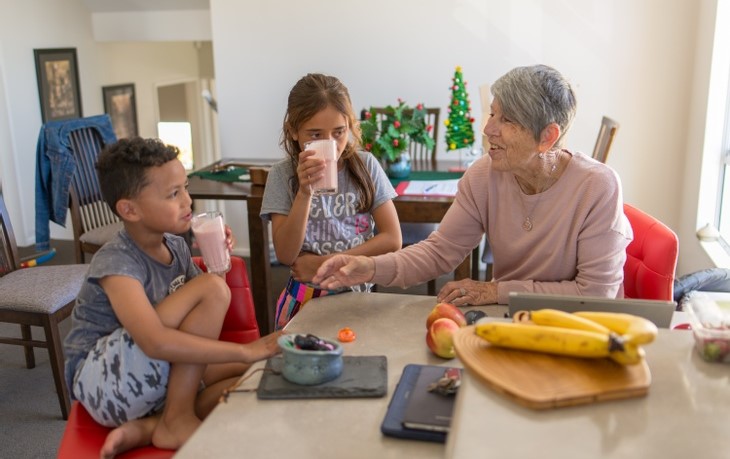“A significant change to our legislation”

Parliament passed the Accident Compensation (Maternal Birth Injury and Other Matters) Amendment Bill last week which expands cover to include specific maternal birth injuries as accidents.
From 1 October, wāhine/birthing parents who experience an injury during labour or childbirth are now eligible for support from ACC.
Megan Main our Chief Executive, says this is a significant day for birthing parents and whānau all over Aotearoa.
“This is the biggest legislative change to the Accident Compensation scheme for some years and is a positive step forward for us and for Aotearoa,” she says.
“But more importantly, it will make a huge difference to thousands of birthing parents and their whānau every year, while helping to improve equity of access to ACC.”

Megan says it is the right thing to do. Maternal birth injuries often have long-lasting effects for parents and whānau and yet the recognition, care and support they receive can vary.
“The birth of a pēpi (baby) is a life-changing moment, but it can also lead to injuries that have long-lasting effects,” says Megan.
Megan says extending our cover to maternal birth injuries means injured birthing parents can access the care and support they need earlier.
“This gets them on the path to recovery quicker and lessens the chances and impact of related injuries in future.”
Megan wanted to thank everyone who has helped ACC prepare for this change.
This includes our team at ACC, but also the providers and especially the birthing parents who shared their stories and helped us shape the way we deliver this support.
Megan acknowledges this change excludes birthing parents with existing and historical injuries.
“I hope they will take some comfort in knowing we’ll be here to help Aotearoa’s future parents,” she says. “And that this change is helping bring the conversation about birth injuries out into the open.”
“It’s a great thing to happen for women”
Professor Bev Lawton has been part of the Expert Advisory Group that’s provided advice to ACC as we’ve worked to implement this change to the law.
Bev (nō Ngāti Porou) is the founder/director of Te Tātai Hauora o Hine (the National Centre for Women’s Health Research Aotearoa) at Victoria University of Wellington.
She was appointed an Officer of the NZ Order of Merit by the Queen for services to women’s health in 2005 and made a Distinguished Fellow of the Royal College of General Practice in 2017.

Bev previously worked as a general practitioner in Wellington for 17 years and co-founded the Wellington Menopause Clinic. These experiences led to an interest in research to answer the many questions relevant to women’s health and inequalities.
“I’m very excited about this law,” she says. “Very excited.”
Bev says it’s a great thing for women, for pēpi (babies) and for whānau.
“Because, you know, we’re talking about the whole whānau unit,” says Bev.
“Getting the right support early on will improve the woman’s quality of life, but it also improves the bonding with the pēpi, the husband – everything works better at home.”
Bev says that, right now, it can be difficult for birthing parents to get the support they need: “This will help level the playing field.”
Bev stresses the importance of making sure people are aware of this change so they can access support from ACC. She says it can be hard for women to speak up about these injuries, which can get in the way of accessing treatment and care.
“Especially when there is a lot of whakamā (shame) around this for women, and there really is. I mean you’re talking down below and all sorts of things,” she says.
“One of the most common symptoms people get is incontinence and it can be bowel or urine. Many, many women will have this problem, and it’s usually related to childbirth,” says Bev.
“Women just don’t know that there’s help out there for them.”
Bev says that, with some of the more severe injuries, it may take a long time to recover. This change gives those birthing parents an opportunity to have extra support and help at home.
“What we want is for mums to be able to return to normal life and the quality of life that they want,” she says.

Birth injuries impact up to 80 percent of birthing parents
Maternal birth injuries are more common than you would think.
Data shows that up to 80 percent of birthing parents will experience an injury during labour or childbirth.
While many of these will resolve with standard maternity care or require only low-level support, a portion will require more significant treatment and care.

Previously, cover for injured birthing parents could only be considered if the injuries were the result of medical treatment.
This change to the legislation amended ‘accident’ to include force or resistance internal to the human body at any time from the onset of labour to the completion of delivery.
This cover is available to parents who give birth after 12.00am on 1 October 2022 and experience one of the injuries listed in the bill.
For those with an accepted claim, we can also cover mental or other physical injuries caused by the covered birth injury.
Treatment injury cover will still be available for birthing parents where appropriate.
The change does not cover pēpi/babies injured during birth, but ACC cover for treatment injuries remains an option for them.
For more information about how to lodge a Maternal Birth Injury claim, what injuries are covered and information for parents and whānau visit:
Maternal birth injuries (acc.co.nz)
For more information about what’s normal and not normal after birth, and when to seek treatment or support visit:
What’s normal and what’s not after giving birth (acc.co.nz)
Learn more about the legislation changes:
Government delivers ACC change to support 28,000 parents | Beehive.govt.nz




